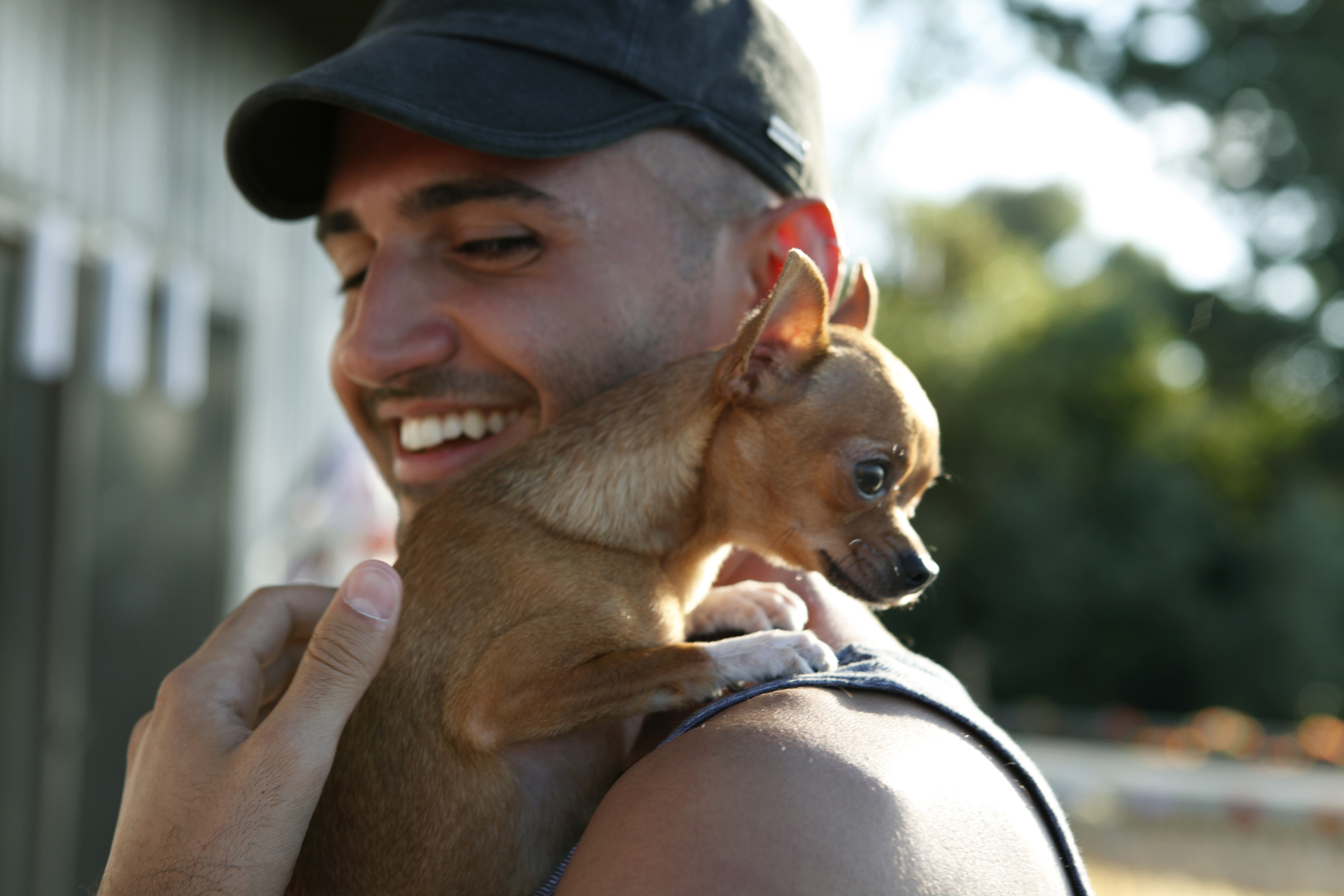TikTok is great for bite-sized bursts of entertainment. It’s also an excellent way to learn about dog breeds, training techniques, and trends. But not everything you learn on TikTok is accurate or even beneficial. Some of it is downright dangerous. While we’re all drawn to the allure of TikTok dog trends, it’s crucial to conduct thorough research before following the masses, especially when the well-being of your canine companion is involved.
Veterinarian, PetMeds partner, and TikTok influencer Dr. Lindsay Butzer shares three TikTok trends dog lovers shouldn’t embrace — and we explain why.
TikTok dog trends to avoid
1. Feeding dogs a raw food diet

According to Dr. Butzer, even though a raw food diet can potentially improve your dog’s coat, skin, and allergies, it poses a health risk. Dogs on a raw food diet could spread salmonella bacteria through licking. If your dog is fond of giving you (or your kids) kisses on the mouth, watch out!
Biologically Appropriate Raw Food (BARF) diets have gained popularity recently. But before you start setting a place at the table for your pup based on this diet’s principles, consider the following:
Nutritional imbalances
Dogs require a specific balance of proteins, carbohydrates, fats, vitamins, and minerals to thrive. Preparing a homemade raw diet may not meet these requirements, potentially leading to nutritional imbalances and deficiencies over time.
Risk of bacterial contamination
Raw meat, bones, and other ingredients in raw diets can carry harmful bacteria such as Salmonella, E. coli, or Listeria. These pathogens can make your dog sick and pose a risk to human family members, especially those with compromised immune systems.
Digestive issues
Some dogs may have difficulty digesting certain raw food components, leading to gastrointestinal upset, including diarrhea and vomiting. The abrupt transition from a processed diet to a raw diet can also cause digestive disturbances.
Dental issues
Contrary to the popular belief that raw bones benefit dental health, they can harm dogs. Bones can cause broken teeth, choking hazards, or blockages in the gastrointestinal tract, requiring emergency veterinary intervention.
Potential for parasitic infections
Raw meat can contain parasites like Toxoplasma, Neospora, or Trichinella. These parasites can lead to serious health issues in dogs and, in some cases, pose a risk to humans, too.
If you’re considering a raw food diet for your dog, consult a veterinarian or a veterinary nutritionist who can guide you on your dog’s specific needs and help you make an informed decision.
2. Adopting French Bulldogs just because they’re cute

Yes, the French Bulldog is now America’s favorite dog breed. But according to Dr. Lindsay, French Bulldogs are expensive and can get sick easily. They can suffer from fatal breathing problems and spinal issues.
Before you adopt a French Bulldog, check out Dr. Lindsay’s video on the subject.
Also, be aware of the following health conditions that French Bulldogs may experience:
Brachycephalic syndrome
French Bulldogs have a brachycephalic, or short-nosed, facial structure. This anatomy can lead to various breathing difficulties, including snoring, snorting, and a reduced ability to tolerate heat or exercise. They are prone to developing brachycephalic obstructive airway syndrome (BOAS), which can severely impact their quality of life and require medical intervention or surgery.
Respiratory problems
French Bulldogs are prone to respiratory issues due to their compromised breathing ability. They are at a higher risk of developing conditions such as elongated soft palate, narrow nostrils, collapsed larynx, and tracheal stenosis. These problems can cause breathing difficulties, coughing, and exercise intolerance.
Heat intolerance
French Bulldogs cannot regulate body temperature well due to their short snouts and compromised airways. They are highly susceptible to heatstroke and require special care to prevent overheating. They may need to avoid excessive exercise or exposure to hot weather.
Skin problems
French Bulldogs are prone to various skin issues, including allergies, dermatitis, and pyoderma. Their skin folds and wrinkles require regular cleaning and monitoring to prevent infections. Additionally, their short coats make them more susceptible to sunburn and cold temperatures.
Eye conditions
French Bulldogs are predisposed to several eye problems, including cherry eye (prolapse of the third eyelid gland), dry eye (lack of tear production), entropion (inward rolling of the eyelids), and cataracts. These conditions may require medical or surgical intervention to manage.
Intolerance of anesthesia
French Bulldogs are more sensitive to anesthesia due to their unique respiratory and physiological traits. This can pose challenges during surgical procedures or medical treatments that require anesthesia.
Expensive medical care
French Bulldogs often require regular veterinary visits, diagnostic tests, and specialized care. Managing their health conditions can be financially demanding, involving ongoing medications, surgeries, or specialized treatments.
The decision to adopt a French Bulldog should be made only after research and consultation with veterinarians or breed specialists. Potential owners should ensure they have the proper financial resources, time commitment, and emotional support available to care for a Frenchie before they adopt one.
3. Adopting a toy breed as your first dog

Toy breeds, such as Chihuahuas, Yorkshire Terriers, or Maltese, can be prone to hypoglycemia, a condition characterized by low blood sugar levels.
Dr. Lindsay states, “Very small breeds are not easy to own. They require tons of feedings to keep their blood sugar elevated so they don’t experience a sugar crash, which commonly sends toy breed puppies to the ER. This can even kill them if they are left home unattended too long without meals or sugar supplements given.”
There are several reasons why toy breeds may have difficulty keeping their blood sugar elevated:
Small size and high metabolic rate
Toy breeds have smaller bodies and higher metabolic rates than larger dogs. They burn calories more quickly and may require more frequent meals or snacks to maintain stable blood sugar levels.
Limited energy reserves
Due to their small size, toy breeds have limited glycogen (stored glucose) reserves in their liver. If they go for extended periods without eating or expend a lot of energy without proper nutrition, their glycogen stores can become depleted, leading to hypoglycemia.
Fast metabolism
Toy breeds have faster metabolisms, which means their bodies process and utilize glucose more rapidly. This can result in quicker drops in blood sugar levels if they haven’t eaten recently or if they have a high energy expenditure.
Inadequate food intake
Toy breeds may have small appetites or be picky eaters. Their blood sugar levels can drop if they don’t consume enough food to meet their energy requirements.
Stress and anxiety
Toy breeds are often more prone to stress and anxiety, which can further impact their blood sugar regulation. Stress can cause a release of stress hormones that affect insulin regulation and lead to fluctuations in blood sugar levels.
Limited fat reserves
Toy breeds generally have less body fat than larger breeds. Fat acts as a reserve source of energy, particularly during periods of decreased food intake. Without adequate fat reserves, toy breeds may be more susceptible to hypoglycemia.
Managing hypoglycemia in dogs
Hypoglycemia in toy breeds can manifest as weakness, lethargy, trembling, seizures, or even loss of consciousness. It is essential for dog owners to be aware of these risks and take appropriate measures to prevent hypoglycemia. Feed your dog small, frequent meals throughout the day, provide a well-balanced diet and appropriate snacks, and monitor your dog’s eating habits and behavior closely. If hypoglycemia is suspected or occurs, seek immediate veterinary attention to stabilize your dog’s blood sugar levels.
Informed, responsible dog ownership
We don’t want to scare you away from adopting or owning a dog. But we recommend due diligence before you commit to a dog based solely on a TikTok trend. Learn everything you can about the breed you want to adopt, and get complete veterinary records from the rescue, shelter, or breeder your pup comes from. Finally, follow your vet’s recommendations for feeding. When it comes down to it, your vet is a better source of knowledge than the most popular TikTok dog trends out there!
ChatGPT assisted in the creation of this article.









